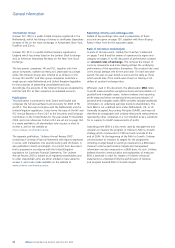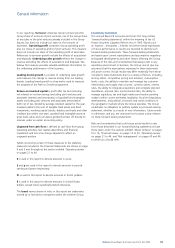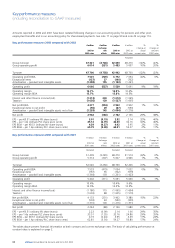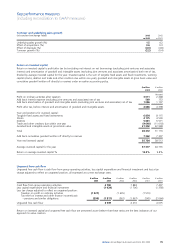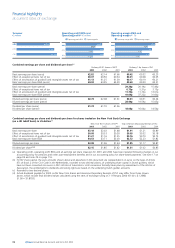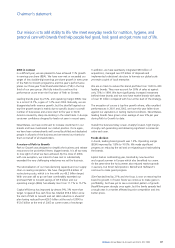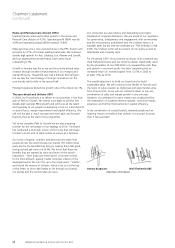Unilever 2003 Annual Report Download - page 15
Download and view the complete annual report
Please find page 15 of the 2003 Unilever annual report below. You can navigate through the pages in the report by either clicking on the pages listed below, or by using the keyword search tool below to find specific information within the annual report.12 Unilever Annual Report & Accounts and Form 20-F 2003
About Unilever
to rise to 75%. Although this will fall short of the 100% target
set in 1996, we have nevertheless achieved very substantial
improvements. We remain firmly committed to working with
others to help drive the whole fisheries market towards a
sustainable future.
Almost all our products rely on water – in growing ingredients,
in manufacturing and in use by the consumer. Our manufacturing
sites have continued to reduce water consumption. Unilever
Indonesia, for example, has since 2001 pioneered a Zero Industrial
Waste policy, which has now been rolled out to all its Indonesian
operations. In Jakarta, treated effluent from ice cream and food
plants is pumped across the industrial estate to our detergent
factory and used as process water. As a result, the factory has cut
water consumption by up to 60%.
We are implementing our environmental strategy to tackle three
additional areas: connecting with the consumer on environmental
care; leveraging our eco-manufacturing skills across the wider
supply chain; and embedding environmental sustainability in our
decision-making processes. We shall report on progress in 2005.
We continue to be the leading company in the food industry
category in two of the Dow Jones Sustainability Indexes (DJSI),
one for the fifth year running - the DJSI World Index.
We were ranked top of the food sector in the UK’s first Corporate
Responsibility Index, published by Business in the Community
in 2003.
Responsible corporate behaviour
We seek to be a responsible employer, business partner and
good corporate citizen, earning respect for our values wherever
we operate.
Unilever has clear values and standards that govern the way we
do business around the world. They are set out in our Corporate
Purpose and our Code of Business Principles which are available
at www.unilever.com. It is by putting these shared values into
everyday working practice that we can operate successfully as
a multinational company, and as a trusted corporate citizen in
diverse local societies.
Our Code Committee oversees compliance with the Code of
Business Principles throughout our business. During 2003 we
rolled out a global e-learning programme for new employees, and
developed and rolled out an e-learning programme on European
competition law to support understanding of the Code. We also
completed work on a set of key principles to achieve greater
transparency of social and environmental standards in our
supply chains.
Two examples illustrate our commitment to the local communities
in which we operate. In India, Hindustan Lever is taking part in an
innovative scheme that trains villagers in business skills and
creates a new sales and distribution mechanism for its products.
Through project Shakti, Hindustan Lever provides free business
training to women’s self-help groups set up by Non-
Governmental Organisations (NGOs) and the government. Once
trained, the women have the option to become local small-scale
sellers of Unilever’s products, which can generate a steady income
of around $20 per month, nearly double their usual household
incomes.
In Ghana, our Annapurna iodine-fortified salt has increased
its sales and brought essential micronutrients within the reach
of low-income consumers. Annapurna consumer-education
programmes have helped promote UNICEF and government
health messages on the need for an improved diet.
Our business depends on understanding and meeting consumers’
needs. We also need to understand societies’ evolving needs if
we are to anticipate potential concerns – as well as trends that
present business opportunities. This is why we continually seek
to engage with our stakeholders. We listen and learn through
consumer carelines, focus groups and websites, research with
universities and participation in industry and government working
groups. We are also involved in dialogue with NGOs and support
international initiatives such as the UN Global Compact.
Partnerships are an effective way to help address social issues;
they are a common feature of our many community initiatives,
on which we spent approximately €66 million in 2003. Our new
global partnership with the World Heart Federation is just one
example: heart disease is now regarded as the principal cause of
death worldwide and our Becel/Flora brand is helping to promote
a healthy heart lifestyle around the world.
To gain the support of our stakeholders, we need to foster
their understanding of our business and the challenges we face.
Our local companies recognise this clearly, and have started to
produce reports that cover their interaction with their local
societies. Following our second Unilever-wide social review
in 2002, last year saw new social reports from some of our
businesses such as those in Brazil and the UK. Designed for local
people, they share the common core theme of responsibility
towards consumers, employees, business partners and society as
the way towards sustainable growth for our business. In 2003 we
have continued to work on the assessment and measurement of
our corporate responsibility performance, to ensure that our next
social review in 2005 gives an insightful and rounded view of
our business.
For more information about Unilever’s environmental and social
activities, visit www.unilever.com/environmentsociety.
Competition
We have a wide and diverse set of competitors in our consumer
goods businesses. Many of our competitors also operate on
an international scale, but others have a narrower regional or
local focus.
Competition is a normal part of business. We aim to compete
and give value to our consumers, customers and shareholders
in three ways:
• by continually developing new and improved products;
• by sharing our innovations and concepts with our businesses
all around the world; and
• by striving to lower the cost of our sourcing, manufacturing
and distribution processes while still maintaining, and
improving, the quality of our products.
We support efforts to create a more open competitive
environment through the liberalisation of international trade.
We also support the fuller implementation of the Single
European Market and inclusion of other European countries
in the European Union.


